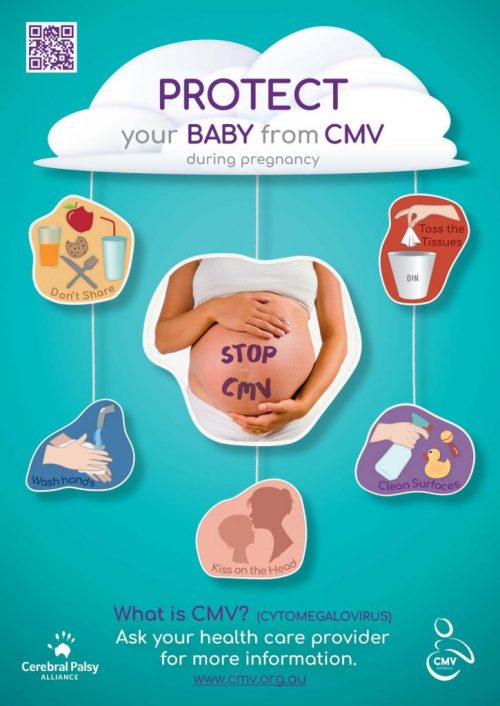What all pregnant women need to know about CMV…
What is CMV:
Cytomegalovirus (CMV) is a common virus which comes from the herpes family of viruses. It is the most common infectious cause of disability in babies. 1-2 babies are born in Australia everyday severely affected by CMV and yet many of us are not aware of it.
Around 30% of children will have acquired CMV before they start kindergarten and around 50% of people have already been infected by early adulthood and 85% by 40 years of age.
The problem is that if you are infected with CMV during pregnancy, especially if you catch it for the first time during pregnancy, or it is in the first half of the pregnancy, it can cross the placenta and there is a chance that your baby could also become infected. 10-15% of infected babies will have some kind of problem, some of the complications associated with CMV include small birth weight, jaundice, lethargy, rashes and problems with their brain, spleen or liver.
About 1 in 5 babies infected with CMV during pregnancy may be born with disabilities such as vision or hearing loss, smaller head size, cerebral palsy, epilepsy, developmental delay, intellectual disabilities or rarely the baby can die.
400 babies are affected by CMV in Australia per year, it is more common than spina bifida, down syndrome, and toxoplasmosis all put together.
Even if babies with CMV show no signs of CMV they are at risk of developing some hearing or vision loss later and therefore need regular testing up to at least school age.
Very few of us actually know about this silent and deadly virus. 9 out of 10 women surveyed had not heard of CMV or how to avoid it and only 1:10 health professionals talk about it with pregnant women and how to prevent it.
Parents of babies affected by CMV often say that they wish someone had told them how to prevent CMV infection, knowledge really is power.
We all know about avoiding soft cheeses in pregnancy because of the risk of listeria and avoiding changing kitty litter due to the risk of toxoplasmosis, it’s time we knew more about CMV as it effects many more babies and families.
Symptoms of CMV:
Many healthy children and adults show no signs of infection however some will have cold and flu like symptoms, cough, sore throat, tiredness, mild fever, rash or gland inflammation.
How do you catch CMV:
Shared through bodily fluids such as, saliva, urine, nasal mucous and breastmilk from infected people. It is very easy to catch from young children due to nappy changing and it being more common to come into contact with their body fluids.
There is an increased risk of catching CMV if you have young children or work in childcare around young children and babies.
The Australian Government does not promote routine testing for CMV as it is often inconclusive and expensive. If you work in a high-risk area such as childcare you should discuss this with your doctor. Once you have been infected your body will develop antibodies that remain in your system for the rest of your life often dormant but can be reactivated.

How to avoid CMV Infection:
There are some easy steps you can take to avoid getting CMV. If every pregnant woman followed these steps it would cut the number of effected babies by 50% from 400 cases to 200, with no cost, a little extra time for the duration of the pregnancy, reduces the spread of other diseases such as colds and flu.
Wash your hands with warm, soapy, running water, for at least 15 seconds and dry them well after:
- touching young children
- changing a nappy
- handling dummies or toys that may have been sucked on
- helping them to blow their nose/wiping nose
- feeding a baby or child
Remember to:
- clean bench top surfaces and toys with simple detergent and water
- don’t share foods, cutlery, straws or toothbrushes
- don’t kiss babies or young children on the mouth, kiss on the head and give cuddles
- Avoid touching your eyes, nose and mouth until you have washed your hands thoroughly
- Throw tissues in the bin immediately, don’t put down on a surface or in a pocket.
The Royal Australian and New Zealand College of Obstetricians and Gynaecologists (RANZCOG) now recommend that ‘All pregnant women and women trying to conceive, should be given information about CMV prevention as part of routine antenatal or pre-pregnancy care.’ March 2019
Childcare centres should put up notifications of any recent CMV cases within their centre so that pregnant mothers whose other children are attending the centre can more strictly observe the rules to avoid contracting CMV.
The Australian Government recommends that any pregnant staff at childcare centres don’t work with children under 2 years of age as this will minimise their risk of contracting CMV.
All pregnant mothers need to be aware of this potentially disabling virus and how they can avoid it for their unborn baby. If you are pregnant please discuss CMV with your Midwife, GP or Obstetrician.
More information and support can be found at the CMV Australia website:
Visit BelindaJoyce.com
You may also like to read:









